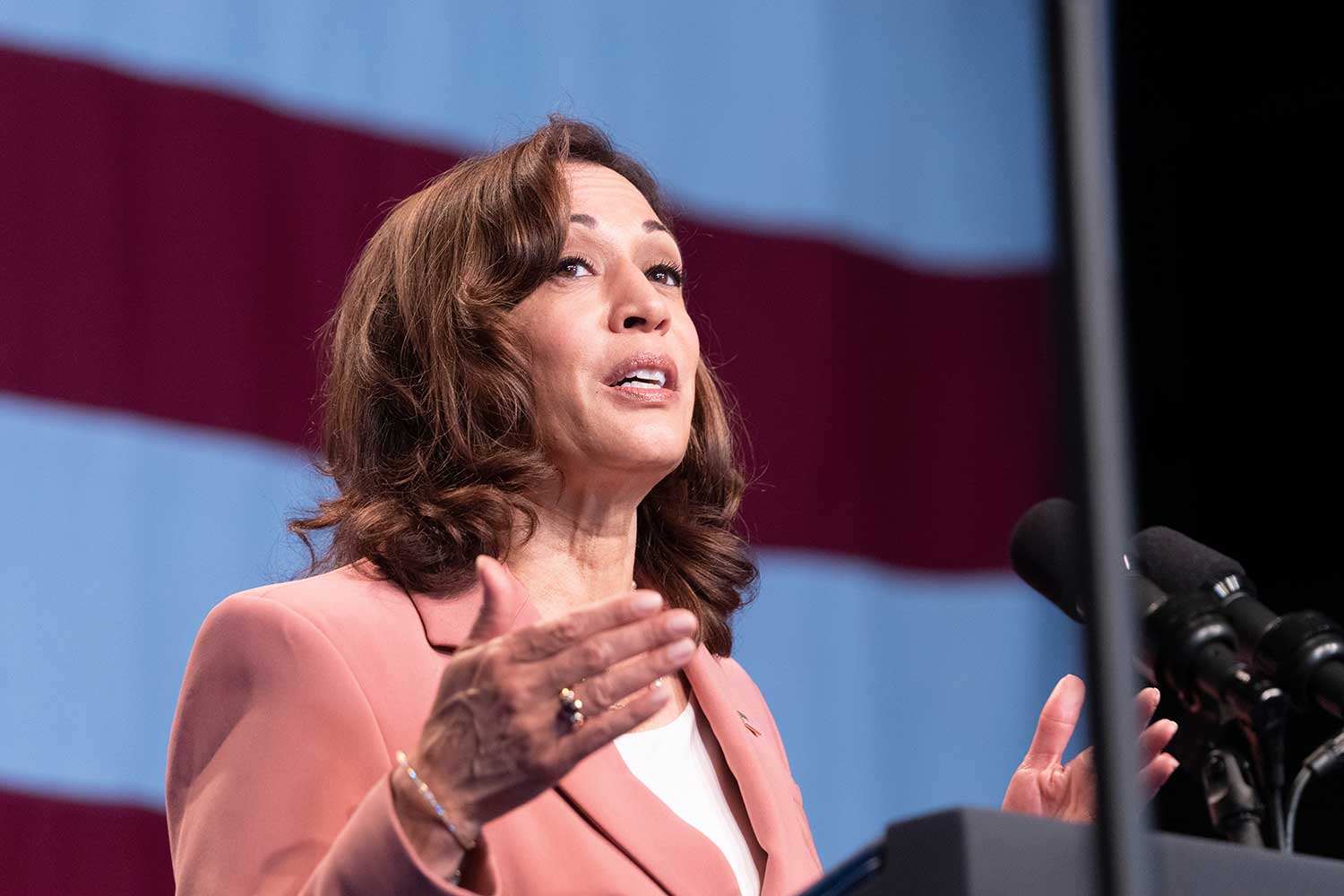Hey team, and welcome back to one5c! We don’t tend to know a ton about vice presidents. Aside from acting as one of the chief’s main surrogates, they also can often fall under the category of meme generators. It’s time for us to get to know Kamala Harris. Fast. A lot’s already been written this week about what she could mean for the economy, health care, retirement, and more. And,—given that she was a bit of a darling of climate activists in the 2020 primaries and that the Biden administration’s racked up a long list of emissions-curbing bona fides—there’s also a lot to unpack about what a Harris platform could mean not just for the U.S. but for the Earth.
So, we asked one5c contributor Tyler Santora to break it down into a cliff’s notes version to get us all up to speed. —Corinne
KAMALA HARRIS ON CLIMATE: 5 THINGS TO KNOW
By Tyler Santora

Four days into her presidential campaign, Vice President Kamala Harris has, understandably, not yet announced her platform. While the consensus is that her positions will center on continuing the work of the current administration, advocates and analysts also see new potential: They believe the platform she ran on in the 2019 election and her history as a prosecutor signal that Harris could push U.S. climate policy even harder than President Biden has. “Nobody thought the climate crisis was going to get solved in four years,” says Holly Burke, communications director of climate change advocacy group Evergreen Action, one of several environmental orgs that have already endorsed Harris.
Here are the key things to know about Harris’ record on climate change policy, and how that might translate to her platform.
Her fingerprints are on Biden’s signature climate law…
The Inflation Reduction Act (IRA) stands apart as the Biden-Harris administration’s gargantuan climate win, featuring the most spending on clean energy and decarbonization in U.S. history. Harris campaigned heavily for the IRA, she cast the deciding vote in the Senate to pass it, and she’s been a consistent and vocal champion of the programs it funds (though she has caught a bit of heat for touting the law’s supposed $1 trillion in spending).
But her influences also mark the legislation. For one, she has a history of driving government investments in electric vehicles, especially electric school buses—which, with her aid, became a prominent feature of the IRA. Her fingerprints are also on the IRA’s Greenhouse Gas Reduction Fund, which allocates $27 billion to helping disadvantaged communities adapt to and address the impacts of the climate crisis.
…and seeing it through is priority No. 1
The IRA represents a big step toward meeting the climate goals set by President Biden, but that job is still a work in progress. For one, he planned to cut U.S emissions in half by 2030, but is on track to get only 64% to 86% of the way to the finish line. And although his administration has made progress in reducing emissions through regulations on electric vehicles, power plant pollution, energy-efficient appliances, and more, there are still gaps to close in order to hit the goals of a zero-carbon electricity grid by 2035 and net-zero carbon by 2050.
With limited time to campaign, some politicos suspect that Harris will be unwilling to move far from Biden’s road map. Indeed, when asked if she would pursue policies like those she supported as a senator, Harris’ climate adviser Ike Irby told The New York Times that she would focus her efforts on implementing the Inflation Reduction Act.
She’s taken more aggressive positions than Biden, but that’s no guarantee
During her Democratic primary campaign in 2019, Harris’ climate platform was considerably to the left of Biden’s. It centered around a $10 trillion plan to cut greenhouse gas emissions and zero our emissions by 2045. A key (and contentious) element of the plan was a carbon tax, a mechanism that charges emitters for the planet-heating compounds they spurt into the atmosphere, and that some economists consider the best way to get corporations in check. She also promised to be tough on prosecution of fossil fuel companies, favored an end to fossil fuel subsidies and offshore drilling, and said there’s “no question I’m in favor of banning fracking”—a move Biden didn’t take.
She’s softened these positions since becoming VP, and it’s unclear if any of those stances will resurface in the refreshed election cycle. “I think [she] is sophisticated enough to appreciate the formula for how President Biden won the election and has kept large parts of industrial America and purple states in the Biden coalition,” Sasha Mackler, executive director of the energy program at the Bipartisan Policy Center think tank, told Semafor.
She’s got a history of going after polluters…
Many of Harris’ biggest climate flexes come from her time as the attorney general of California. In 2016, she launched one of the first investigations into Big Oil’s (in her case Exxon Mobil’s) efforts to mislead the public and shareholders about the risks of climate change, though the probe didn’t lead to a suit. In 2015, she sued Plains All-American Pipeline over a 2015 oil spill. She even went after the Obama-Biden administration over the Interior Department’s loose environmental assessment process for issuing fracking permits off the west coast. She also won an $86 million settlement from Volkswagen for cheating on diesel emissions tests. How much she might return to these tactics—or temper them—as the nation’s top executive is another open question.
…and prioritizing environmental justice
If there’s a common thread in Harris’ climate report card, it’s been in representing the interests of those who feel disproportionate impacts of polluters’ lackadaisical attitude toward the environment. As a senator from California, Harris co-sponsored the Climate Equity Act of 2020, a law that would have required lawmakers to consider the impacts of environmental legislation on marginalized communities. She also co-sponsored three other bills that focused on climate and environmental justice: the Water Justice Act, Environmental Justice for All Act, and Preparing Superfund for Climate Change Act of 2019.
“She’s someone who has really demonstrated for the last two decades of her career that she’s going to prioritize climate and justice for communities at every opportunity,” Evergreen Action’s Burke says. “We expect and are confident based on our conversations with her and her team, that she’s going to…raise the bar for that next level of how we continue to build a thriving, just, clean energy future.”
Tyler Santora is a freelance science journalist, editor, and fact-checker. He has written for publications such as Undark, Scientific American, Popular Science, and more.
SPONSOR

Restore the Planet, One Mission at a Time
The responsibility to protect our planet falls on all of us. Planet Wild is a community of nature lovers pooling their contributions to fund efficient projects that save animals, oceans, and forests. And you can join them. Each month, your contribution will help fund a targeted nature revitalization mission where it’s needed most. With monthly videos, you’ll even get to see the impact you’re making.
The first 150 people to sign up via the link (coupon code automatically applied) will receive the first month for free as a special offer from us.
THE ROUNDUP
In the news this week
The EPA announced $4.3 billion in grants for 25 community-driven projects in 30 states and with one tribe. Among the programs receiving funds are a couple multistate collaborations: Money going to the Clean Corridor Coalition will invest in charging infrastructure along I-95 in New Jersey, Connecticut, Delaware, and Maryland; and the Atlantic Conservation Coalition will put cash toward natural carbon sinks including wetlands, forests, peatlands, and urban canopies in North Carolina, South Carolina, Maryland, and Virginia.
In a throwback to old-school approaches to plant-based fare, Beyond Meat is rolling out Sun Sausages. Unlike the company’s core product line, these links aren’t pretending to be meat. Instead, they’re a blitzed-up blend of plant proteins like red lentils and fava beans. They pack 12 grams of protein per link and are available at Sprouts stores nationwide.
An investigation by The Washington Post found that half of all carbon credit preservation projects in the Brazilian Amazon are dealing in publicly protected lands. That means a couple things. First, that the “carbon cowboys” marketing such credits—which the likes of Netflix, Delta, and Boeing purchase to offset their emissions—are profiting off of giant swaths of territory they have no legal right to sell. Second, that the credits do little to reduce emissions.
Ballooning demand for electricity to power artificial intelligence is imperiling the U.S. ability to reach its climate goals, according to a new report published by Rhodium Group. We’re on pace to reduce emissions by 43% by 2023, missing the Biden administration’s goal of a 50% cut. “This extra demand [from AI and data centers] means emissions could have been lower by 2025,” Ben King, one of the lead authors of the report, told Bloomberg.
The world broke temperature records for two straight days early this week, according to the E.U. Copernicus Climate Change Service. The average surface temperature on Sunday was 62.76 degrees Fahrenheit, and on Monday it ticked up to 62.87 degrees—the highest ever recorded. Crucially, these spikes exist outside an El Niño year, a phenomenon that normally drives up the mercury.
